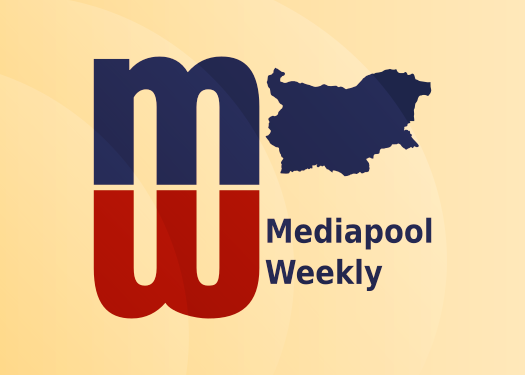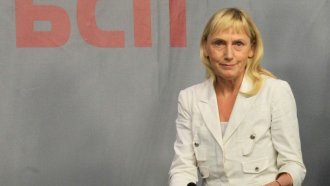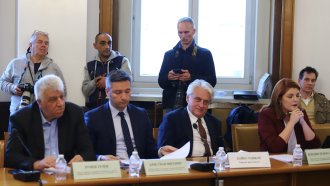Commentary:
European Elections 2019 Recap
GERB and the Bulgarian Socialist Party

GERB leader and Bulgarian PM, Boyko Borissov BSP leader Kornelya Nikova
GERB won the EU elections with a decisive result of 31% to 24,26% for the runner up, the Bulgarian Socialist Party. GERB entered the campaign slightly behind BSP, within the range of the statistical error. This was an incredible opportunity for the largest opposition to win this election, or at least loose it by a point or two: the months leading to the campaign were marked by an unprecedented wave of corruption scandals, involving high ranking GERB officials, most notably the ApartmentGate scandal and evidence of systematic embezzlement of EU funds by particular officials, who have used said funds to build private luxury villas.
In this context, BSP had the clear advantage at the beginning of the campaign. But, the leaders of the largest parliamentary opposition did not manage to make use of it. As many observers noted, while the corruption scandals around GERB do resonate highly among voters, snap elections are not what most voters want at this time. Moreover, EU elections are EU elections, the issues are different, and should not be confused. Many voters are traditionally uninterested in EU elections, while those who are seem to predominately feel that the larger issues are those, which the candidates should focus on.
BSP not only focused, but bluntly restricted their campaign to GERB’s corruption scandals. BSP ran on a limited platform that GERB should resign and Bulgaria should have snap elections. They failed to touch not only on European issues – or issues of Bulgaria’s role in the EU and vice versa – but they did not even address domestic issues outside of GERB, which are of interest to voters, be it not relevant to EU policies per se. In the meanwhile, GERB leader and Bulgarian PM, Boyko Borissov took the helm of GERB’s campaign and managed to swiftly gain over five points compared to indicial polls for less than five weeks.
Two things became abundantly clear from these two interdependent events: one, Boyko Borissov still has a personal dormant electoral resource, which may be tapped ad hoc at any given time; second, voters will punish you, if you rely on your opponent’s weakness and decide to not fight to win their vote. BSP leader, Kornelya Ninova in a way made an almost scientifically controlled experiment, showing the importance of campaigns: failing so miserably in a context, which gave her party an advantage one could only dream of.
The EU elections for both GERB and BSP are much more important now, after the results are in, than they seemed to be before. Both BSP’s loss, and GERB’s win by such an unlikely margin (given the picture going into the campaign) separately gave the two parties a window for something that might have seemed unlikely before.
Two key figures no longer have their posts. In both cases the way this came about is curious to say the least.
After the initial results were announced, and it was clear BSP had lost miserably, the party leader, Korneliya Ninova made sure she will not resign. Yes, there will be a procedure for a new leader, but the procedure itself, as she put it, would take at least several months. A day later she resigned.
Tsvetan Tsvetanov, PM Boyko Borissov’s Number-Two, recently resigned from the parliamentary group’s chairmanship, but still at the head of GERB’s campaign desk, and deputy chairman of the party, finally resigned all his posts from the party’s establishment. Tsvetanov was at the heart of the Apartmentgate scandal. He resigned his post from Parliament, but kept his other key positions within GERB structures. At the beginning of the campaign it was clear that Borissov is taking over, while Tsvetanov kept away from the spotlight: it was obvious that Borissov is taking over to win back the votes Tsvetanov and the ApartmentGate scandal jeopardized.
So, Borissov, as many observers stress - not GERB – won this election. But this did not immediately mean anything for Tsvetanov.
On the Thursday after the election, though, Tsvetanov resigned all his posts after a meeting with Borissov and he accepted his resignation.
Tsvetanov and Borissov have been together since the beginning and it is unclear what this shift will actually mean. Who will take Tsvetanov’s place is an important point, which we have yet to see: Not only has the dynamic between Borissov and Tsvetanov been an almost symbiotic one but Tsvetanov personally manages and controls GERB’s local party structures.
In other words, is Tsvetanov’s removal a sign of deep crisis within GERB going into disaster, or has Borissov a plan B, which will make GERB even stronger going forward? Judging from Borissov’s attitude on Friday, the latter seems to be the case. He talked to reporters, thanked Tsvetanov for his work over the years, but at the same time – in his characteristic style – managed to discredit Tsvetanov’s importance within the party enough to make it perfectly clear that GERB has one leader, and he still holds all the power. This was the message. Time will tell of the substance behind it.
The Movement for Rights and Freedoms (DPS)
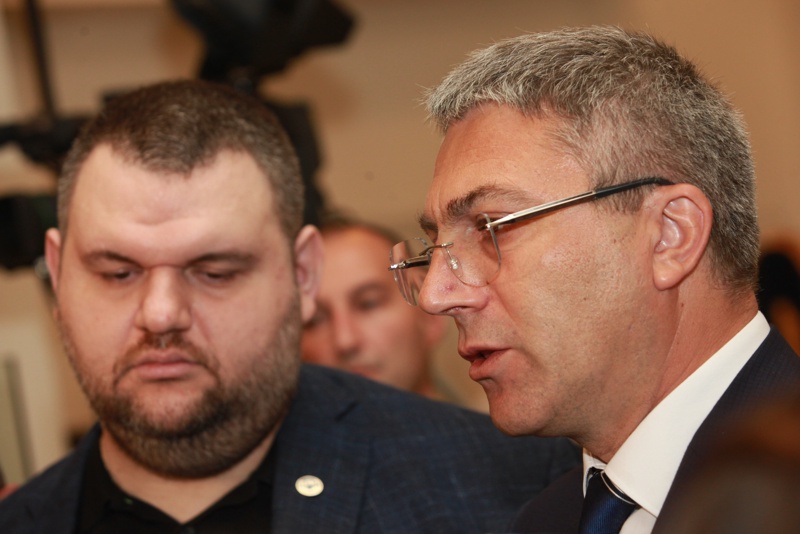
DPS MP and media mogul Delyan Peevski and DPS leader Mustafa Karadaya
The Movement of Rights and Freedoms (DPS) is third with 16,55%, as anticipated and will have three MPs in the next European Parliament. The only interesting development in DPS – as always – is what DPS MP and media mogul Delyan Peevski will do with his mandate. As in the last EU elections, he announced he will not assume his membership, along with the leader of the ballot, the party leader Mustafa Karadaya. The two men were first and second in the ballot.
Delyan Peevski de facto lives in Dubai; before this week, he has entered the current Bulgarian Parliament one single time, when the MPs get sworn in. After the EU elections he appeared twice: to announce he will not be going to the European Parliament (“I am more needed here”) and the second – to declare he is contemplating a bill to lower VAT for bread and free kindergartens. We will see whether these populist promises become realized in the form of a bill, tabled in Parliament in the weeks to come.
VMRO
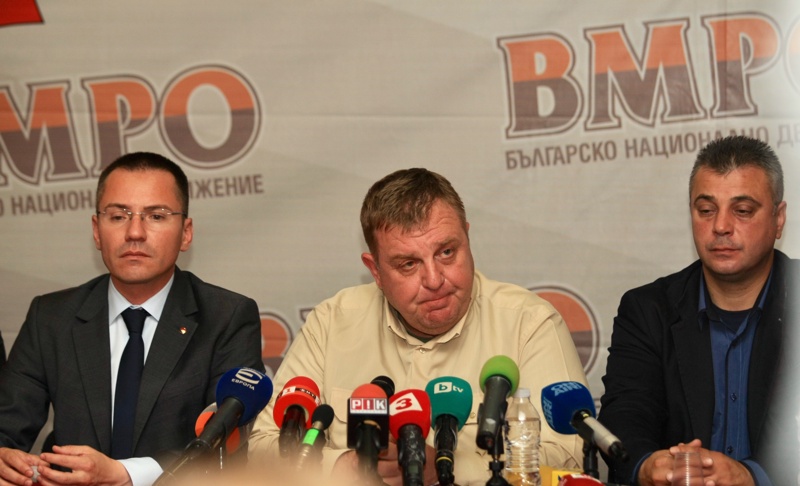
Angel Dzhambazki (left) and the leader of the IMRO – Bulgarian National Movement and Minister of Defence Krasimir Karakachanov (center)
The only party of the coalition partner, the United Patriots to make it into the European Parliament. The far-right nationalist VMRO will have two seats. The curious point here is that the other two far-right parties, which are part of the ruling coalition – ATAKA and NFSB – managed just about 1% of the votes each: less than the former mayor of Mladost, who is under house arrest and recently sentenced to 20 years in prison, who ran as an independent, and got 1,55% of the votes. This legitimizes VMRO as the inner leader, it seems, but at the same time, the three parties have been fighting amongst themselves from well over a year. Will this result finally break the so-called “small coalition” and what would such a development mean for the delicate balance within the Bulgarian Parliament, which GERB has only just managed to keep of late, remains to be seen. In any event VMRO won the far-right vote on a clear nationalist platform, similar to what can be seen from most right-wingers in other EU countries. They explained their views on Europe, and Bulgaria’s role in it, which ultimately won them these votes, which otherwise could have ended up in any of the other two members of the United Patriots.
Democratic Bulgaria

New european MP Radan Kanev (left) and the leader of Democratic Bulgaria Hristo Ivanov (center)
Democratic Bulgaria managed a good result and will be sending one European MP, Radan Kanev. The numbers show that the mobilization among supporters was quite high; the messages of the campaign (pro-European Union, anti-corruption, rule of law as top priority, etc.) resonated with voters. DB came in first political party among the votes, which Bulgarians cast abroad. The result is good but will prove meaningful only of the coalition manages to improve it over the next elections (the next elections are local and will be held in the fall). This means two related milestones: one, for the coalition to manage to maintain the good partnership it managed to build, and second to try and expand its base.
Given the success of VMRO with their European platform (be it skeptical), DB’s success and BSP’s failure to attract votes with their campaign, deprived of any European issue, the good news overall is that the Bulgarian voters respect the fact that European elections should be about Europe, are not oblivious to these issues and have a position on them. Something that BSP and the other two parliamentary nationalist parties apparently cannot grasp.
In other news:
Court sets dangerous precedent in ruling against journalist
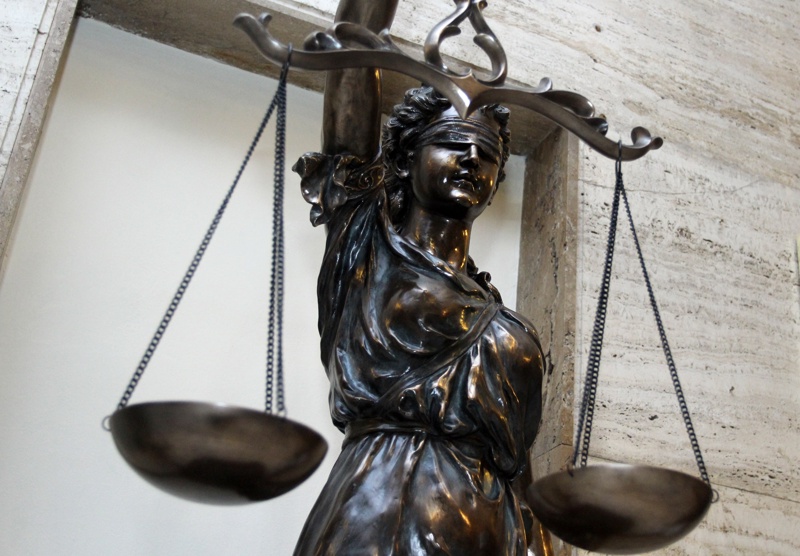
Long time journalist from Economedia’s Capital Weekly was sentenced to a 1000-leva fine in a defamation case in a final ruling this week by the Sofia District Court. The ruling sets a dangerous precedent and is alarming to the highest degree, as the ‘defamation’ is for a comment Bossev made in a TV interview, which was based on facts from his reporting: facts, which themselves are not contested by the court or otherwise. Moreover, the judge in the case is one Petya Krancheva. Bossev has written many pieces, which involve this particular judge, and the reporting does not paint her in a positive light, to say the least. The defense tabled a motion early on for Krancheva to recuse herself, as she could not maintain impartiality, given the defended has been so openly critical towards her in the past. She refused, arguing she has never read the pieces in question.
The case itself is about the former head of the Financial Supervisory Commission, Stoyan Mavrodiev. In 2015 Bossev said in a TV interview that Mavrodiev uses the commission to repress Capital Weekly and Dnevnik Daily by issuing unprecedented fines which the commission set at the time for the two media outlets, both part of Economedia, co-owned by Ivo Prokopiev. The two fines of 150’000 leva each were both overturn by the courts as unlawful. In other words, clearly, the fines were an instrument for repression, and a sloppy one at that.
But Krancheva’s reasoning here is not so much on the facts themselves. It is the use of Mavrodiev’s name because the actual orders were signed by Mavrodiev’s deputy, Angel Dzhalazov, and not by Mavrodiev himself.
The ruling is obviously made on a technicality at best: the signature of the deputy does not make Mavrodiev any less the head of the organization. Krancheva doesn’t even dispute the fact or imply that somehow these fines were set not by his direction or even knowledge.
Given how thin this ruling is, it sets not only a dangerous precedent: journalists must not speak publicly even when their claims are based on facts. It also sends a clear message, and not for the first time – journalists should be very careful who they report on, what they uncover and – foremost – what shady dealings and misuse of power and corruption they make public.
CEO of NETINFO Hristo Hristov raises alarm of ‘unprecedented’ meddling in editorial policy

The CEO of NETINFO Hristo Hristov went public this week about ‘unprecedented’ meddling in its editorial policy since the new ownership took over. 70% of NETINFO is owned by the NOVA Broadcasting Group, which was recently purchased by the infamous Domuschiev Brothers (business moguls, with alleged close ties to the government).
Gong.bg is one of the leading sport media outlets in Bulgaria, operating for over a decade, both online and on the radio. The Domuschiev brothers own one of the larger Bulgarian football teams in the country, which raised the question early on as to possible problems for the sport edition. And sure enough, Hristov gave a lengthy account of a series of events, which swiftly led to the whole of Gong.bg’s team resigning and changing the name of their radio program, which is no longer part of Gong.
Hristov wrote in a Facebook post that he had received instruction to let go of the editor-in-chief of Gong, Nikolay Alexandrov. As Alexandrov is an open supporter of CSKA, which is Domuschiev’s own Ludogorets’s rival, a move of this sort was somewhat expected. Moreover, Hristov said that there was pressure on the editorial team to publish misleading or unverified stories against CSKA, which the editors refused.
It’s likely that the new managers of NOVA did not anticipate that, first, the principal editorial team of Gong would leave in solidarity with their colleague Nikolay Alexandrov, but more importantly – second – that Hristov would make the whole story public.
Svobodna Evropa asked him why he came forward. He said that he thought about all the journalists who leave (or rather, have been made to leave) because of being critical towards powerful officials, and how this is done ‘without saying a word’. He then goes on to explain that he did not want for him and the Gong case to be the consecutive story of a silent exit.
NOVA came out with an official statement claiming Hristov’s account of the events is manipulative and that NOVA upholds all journalistic standards. Soon thereafter Hristov said his colleagues at NETINFO had received an e-mail from one of the newly appointed executives on NOVA that Hristov’s functions as CEO are suspended until further notice.
Fines for EU funds violations for B&Bs are being overturn
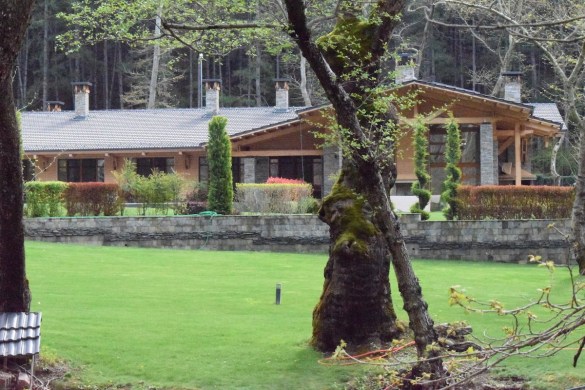
The State Agriculture State Fund, which operates the EU funds for agriculture uses a legally flawed system for controlling spending, which ultimately transfers any fines for violation to the taxpayer. Mediapool discovered that a fine was overturned last year by the Supreme Administrative Court and will now be paid by the state budget.
Multiple cases of high-ranking officials having redirected EU funds, intended for B&Bs, to renovate or build their personal villas emerged in the past few months. While the ministry and the fund said they will be reviewing all such cases and fining violators, this is only half the story. In fact, these fines are easily transferred back to the public budgets, as the case in question demonstrated.
The company Eiden 1 were granted EU funding to build a B&B. The B&B in question never functioned as such but served as a private villa for the company owners. The company was fined 195’000 leva as a result. But then the Supreme Court ruled that the entire methodology, which is used to determine wrongdoings and violation is unlawful. Thanks to this, anyone fined under this methodology (as was done in the case, described here) may challenge the measure because it was conducted under a regulation, which the Supreme Court has found to be unlawful.
Measles cases in Bulgaria now over 800

As of May 30, the registered measles cases in Bulgaria have reached the 800-mark. The head of the National Center for Contagious Diseases, Professor Todor Kantardzhiev, told the Bulgarian National Radio in the morning of May 30 that the official number of cases is 792 and is sure to pass 800 by the end of the day.
The cases in Blagoevgrad were 156, 272 were the recorded cases in Sofia; Kantardzhiev expressed his alarm that 77 cases were just registered in the region of Kyustendil and Dupnitsa, which were previously not much affected by the outbreak.
He underlined that the center sees many cases of children, which do not have antibodies in their bloodstream, i.e. have not received vaccines, although they possess the necessary documents, according to which they have been vaccinated in accordance to the so-called national vaccination calendar.
Ключови думи
За честна и независима журналистика
Ще се радваме, ако ни подкрепите, за да може и занапред да разчитате на независима, професионална и честна информационно - аналитична медия.
 0 коментара
0 коментара
Екипът на Mediapool Ви уведомява, че администраторите на форума ще премахват всички мнения, съдържащи нецензурни квалификации, обиди на расова, етническа или верска основа.
Редакцията не носи отговорност за мненията, качени в Mediapool.bg от потребителите.
Коментирането под статии изисква потребителят да спазва правилата за участие във форумите на Mediapool.bg
Прочетете нашите правила за участие във форумите.
За да коментирате, трябва да влезете в профила си. Ако нямате профил, можете да се регистрирате.
